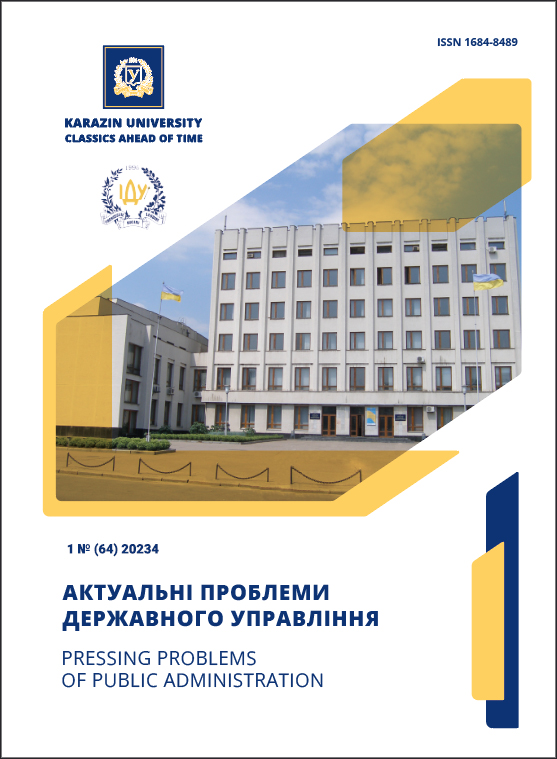Public Management of Communal Property: Best Practices for the Post-War Recovery of Ukraine
Abstract
The article investigated the public management of communal property in the context of Ukraine’s post-war reconstruction. Special attention is paid to the analysis of national, international, and public initiatives aimed at restoring the destroyed infrastructure and ensuring the effective management of communal facilities. Different countries’ best practices and methods to restore communal property after conflicts and natural disasters were studied.
After World War II, Germany received significant financial and technological aid under the Marshall Plan, which allowed for a rapid rebuilding of industry and infrastructure. Using the latest technologies and innovations contributed to increasing the efficiency and quality of restoration works. After the war, France developed its own Plan Monnet, which emphasized centralized planning and state regulation. The state actively coordinated the reconstruction process, providing financial and administrative resources. Post-war Japan achieved an “economic miracle” thanks to the implementation of effective economic reforms and the development of high-tech industry. Innovation and research have become critical elements of reconstruction.
The article differed from other studies in its complexity and emphasis on the practical aspects of the implementation of restoration projects, in particular on the possibility of involving public-private partnerships and public initiatives. The key challenges faced by local self-government bodies were also considered, and specific recommendations were offered to improve the efficiency of communal property management in the post-war period. The conclusions of the article emphasized the need for coordinated efforts of all interested parties for the successful recovery and sustainable development of Ukraine.
The results of this study can be used by the government, local authorities and public organizations to develop strategies and programs for the restoration of communal property. Implementation of effective management practices will contribute to faster and better reconstruction, increase of economic stability and improvement of the population’s well-being.
Downloads
References
Velychko, L., & Kashchenko, D. (2023). Specificity of the activities of public authorities in emergency and crisis situations. Theory and Practice of Public Administration, 2 (77), 7–21. DOI: https://doi.org/10.26565/1727-6667-2023-2-01 [in Ukrainian].
Storonianska, I.Z. (2022). Challenges and priorities of asset management of territorial communities in wartime conditions: scientific and analytical report. Lviv: M. I. Dolishny Institute of Regional Research of the National Academy of Sciences of Ukraine. (Series “Problems of Regional Development”) [in Ukrainian].
Hibadullin, O., & Kosenko, V. (2023). Theoretical aspects of forming a sustainable system of industrial and personnel recovery in the region during the post-war period. Actual Problems of Public Administration, 2 (63), 25–43. DOI: https://doi.org/10.26565/1684-8489-2023-2-02 [in Ukrainian].
In Touch Ukraine Foundation. (n.d.). Humanitarian aid from the UN. URL: https://www.intouchukraine.com/uk/nashi-proekts/ [in Ukrainian].
Drokhobetskyi, I. (2022). Features of managing communal property in the conditions of administrative-territorial reform. Actual Problems of Management and Public Administration in Wartime and Post-War Reconstruction of Ukraine, 88–91 [in Ukrainian].
Duginets, H., & Kolodko, N. (2023). Economic recovery and development of countries after armed conflicts: experience for Ukraine. Foreign Trade: Economics, Finance, Law, 5, 46–65 [in Ukrainian].
Kovalenko, M.M., & Dunayev, I.V. (2023). Components of public policy in the conditions of implementing a mobilization model of economic development. Theory and Practice of Public Administration, 1 (76), 7–25. DOI: https://doi.org/10.26565/1727-6667-2023-1-01 URL: https://periodicals.karazin.ua/tpdu/article/view/22287/20607 [in Ukrainian].
Ministry of Infrastructure of Ukraine: official website. (n.d.). URL: https://mtu.gov.ua/ [in Ukrainian].
Orel, Yu.L., & Kulinich, O.V. (2023). The impact of business deregulation on post-war economic recovery in Ukraine: public administration aspect. Scientific Notes of Tavria National University Named After V.I. Vernadsky. Series: Public Administration, 34 (73), 6. DOI: https://doi.org/10.32782/TNU-2663-6468/2023.6/06 [in Ukrainian].
Orel, Yu., & Rychka, R. (2023). Public administration in the context of involving territorial communities in the development of solar energy: analysis of innovative models and challenges for Ukraine. Actual Problems of Public Administration, 2 (63), 44-–55. DOI: https://doi.org/10.26565/1684-8489-2023-2-03 [in Ukrainian].
Plan of Recovery of Ukraine. (n.d.). URL: https://recovery.gov.ua/ [in Ukrainian].
Sidenko, S.V. (2022). Priorities and factors of innovation policy: experience of certain East Asian countries and strategic imperatives for post-war reconstruction of Ukraine. Economy of Ukraine, 11, 47–75. DOI: https://doi.org/10.15407/economyukr.2022.11.047 [in Ukrainian].
Cabinet of Ministers of Ukraine. (2024). Recovery Funds of Ukraine. URL: https://www.kmu.gov.ua/gromadskosti/fondi-vidnovlennya-ukrayini [in Ukrainian].
World Bank. (n.d.). Targeted Fund for Support, Recovery, Reconstruction, and Reform of Ukraine (URTF). URL: https://www.worldbank.org/uk/programs/urtf/overview [in Ukrainian].
Aboushala, M., & Haj Ismail, S. (2022). Post-war rural resilience as a development strategy in theory and practice. TRC Journal of Humanitarian Action, 1 (1), 19–29. DOI: https://doi.org/10.55280/trcjha.2022.1.1.000
Jacoby, T. (2007). Hegemony, modernization and post-war reconstruction. Global Society, 21 (4), 521–537. DOI: https://doi.org/10.1080/13600820701562751
Orel, Yu., Kulinich, O., Smahliuk, A., Popov, A., & Rychka, R. (2024). Fostering resilient growth in local communities via governance strategies: key challenges and effective tools. Archives des Sciences, 74 (3), 184–189. DOI: https://doi.org/10.62227/as/74329
Thumm, N. (2018). The good, the bad and the ugly – the future of patent assertion entities in Europe. Technology Analysis & Strategic Management, 30 (9), 1046–1056. DOI: https://doi.org/10.1080/09537325.2018.1434875
World Bank. (2024). Updated Ukraine Recovery and Reconstruction Needs Assessment Released (Febr., 15, 2024). URL: http://surl.li/yyqolj
World Bank. (2024). Ukraine – Third Rapid Damage and Needs Assessment (RDNA3): February 2022 – December 2023 (English). Washington, D.C.: World Bank Group. URL: http://documents.worldbank.org/curated/en/099021324115085807/P1801741bea12c012189ca16d95d8c2556a

